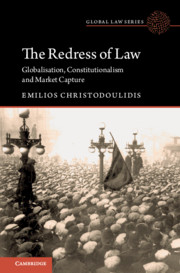Book contents
- Reviews
- The Redress of Law
- Global Law Series
- The Redress of Law
- Copyright page
- Dedication
- Contents
- Acknowledgements
- Introduction
- Part I Political Phenomenology
- Part II Political Constitutionalism
- Part III Market Constitutionalism
- Part IV Strategies of Redress
- 4.1 The Constitutional Situation
- 4.2 Militant Formalisms
- 4.3 Constitution, Autogestion, Rupture
- 4.4 Constitutionalising Contradiction:
- Epilogue
- References
- Index
4.2 - Militant Formalisms
from Part IV - Strategies of Redress
Published online by Cambridge University Press: 26 March 2021
- Reviews
- The Redress of Law
- Global Law Series
- The Redress of Law
- Copyright page
- Dedication
- Contents
- Acknowledgements
- Introduction
- Part I Political Phenomenology
- Part II Political Constitutionalism
- Part III Market Constitutionalism
- Part IV Strategies of Redress
- 4.1 The Constitutional Situation
- 4.2 Militant Formalisms
- 4.3 Constitution, Autogestion, Rupture
- 4.4 Constitutionalising Contradiction:
- Epilogue
- References
- Index
Summary
It will come as little surprise that the most widespread defence of formalism sees it as a safeguard against the exercise of political power. Martii Koskenniemi speaks for many when, in The Gentle Civilizer of Nations, he defends a ‘culture of formalism’ as entailing ‘that there must be limits to the exercise of power, that those who are in positions of strength must be accountable and that those who are weak must be heard and protected’. The ‘culture of formalism’ denotes ‘a culture of resistance to power, a social practice of accountability, openness, and equality whose status cannot be reduced to the political positions of any one of the parties whose claims are treated within it’ (2001: 500). If this justification is, for good reason, shared amongst liberals, the appeal of formalism can be extended to critical theory too, even where it is not invoked by name. Important examples can be found in the field of social rights constitutionalism. The first refers to social action litigation (SAL) of the type that was developed in India in the late 1970s and early 1980s.
- Type
- Chapter
- Information
- The Redress of LawGlobalisation, Constitutionalism and Market Capture, pp. 461 - 479Publisher: Cambridge University PressPrint publication year: 2021



